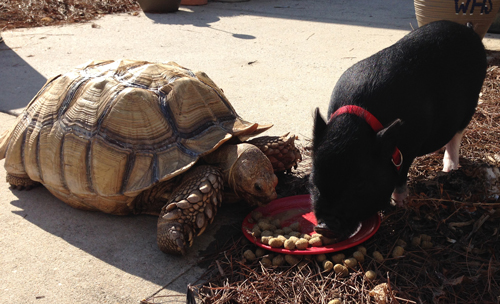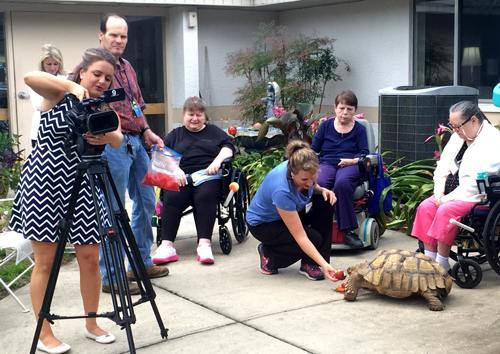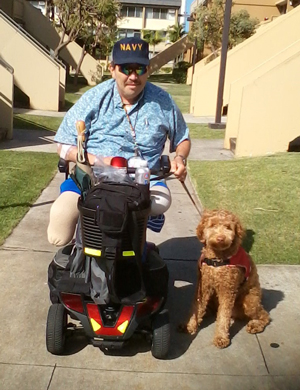Dec 14, 2016
Animals Help People Heal in Rural Areas
by Allee Mead
At the Jackson Hole Therapeutic Riding Association (JHTRA), you can often find students practicing their fine motor skills. At school, these children may be teased at lunch when they struggle to open their milk cartons; many hide the cartons under the table so no one else can see. But at JHTRA, they don't have to hide.
 JHTRA not only
provides these students a safe space to practice their
skills but also provides a unique atmosphere so that the
therapy sessions don't feel like therapy. A student sits
on top of a horse, and the instructor clips clothespins
into the horse's mane. The child practices her fine motor
skills by unclipping the pin and then clipping it onto
the instructor's collar.
JHTRA not only
provides these students a safe space to practice their
skills but also provides a unique atmosphere so that the
therapy sessions don't feel like therapy. A student sits
on top of a horse, and the instructor clips clothespins
into the horse's mane. The child practices her fine motor
skills by unclipping the pin and then clipping it onto
the instructor's collar.
The students aren't in a clinical, white-walled place, and so for a lot of our riders, they don't necessarily know that they're receiving therapy. And I think that is, in part, what allows us to be so successful.
"It's not a traditional therapeutic session," explains Tori Fancher, Executive Director of JHTRA. "The students aren't in a clinical, white-walled place, and so for a lot of our riders, they don't necessarily know that they're receiving therapy. And I think that is, in part, what allows us to be so successful."
JHTRA is just one of many rural organizations across the country using animals to help people heal. Hawaii Fi-Do pairs service dogs with people who have disabilities other than blindness. These dogs can be trained to do anything from retrieving fallen objects and opening doors to sounding an alarm if the owner needs medical attention.
Sometimes, animals are there for emotional support and social interaction. Shelly the tortoise and Oliver the pot-bellied pig simply keep Chautauqua Rehabilitation & Nursing Center (CRNC) residents company. Yet the animals' "simple" task helps residents feel happy and purposeful and even puts visitors at ease in a new environment.
Service animals increase people's independence and self-confidence.
For many individuals, animals are an important part of their everyday routine. "Service animals increase people's independence and self-confidence," explains Travis Hoffman, Advocacy Coordinator at Summit Independent Living in Montana. He adds that service and therapy animals alike give many people a sense of purpose: "If these people don't have anything else in their lives, they have this animal."
Humble beginnings
Two of these organizations were founded with animals in mind; for the third organization, the animals found them.
 Susan Luehrs, founder of Hawaii Fi-Do, was a
Special Education teacher in the rural Kahuku High &
Intermediate School of Kahuku, Hawaii. She had begun a
program that brought therapy dogs into the classrooms,
and she loved watching once-reserved students interact
with the animals.
Susan Luehrs, founder of Hawaii Fi-Do, was a
Special Education teacher in the rural Kahuku High &
Intermediate School of Kahuku, Hawaii. She had begun a
program that brought therapy dogs into the classrooms,
and she loved watching once-reserved students interact
with the animals.
Even better, other students began to talk more to their classmates with special needs, as the children bonded over the dogs. "And our kids just started talking and smiling," Luehrs says. "They had something that people wanted to look at and touch."
We're very, very grassroots. We have no training facility; we use the community as our facility.
Luehrs began researching service dogs and soon became certified as a service dog trainer. She founded Hawaii Fi-Do, the state's first accredited service dog program, in 2000. The program, serving those with disabilities other than blindness, is run by a handful of part-time staff and many volunteers. "We're very, very grassroots," Luehrs says. "We have no training facility; we use the community as our facility."
This two-minute video features Hawaii Fi-Do and laws related to service animals:
Like Luehrs, JHTRA's Fancher worked with students with special needs. "I've been working with individuals with disabilities essentially my whole life," Fancher explains: Some of her family members have a disability, Fancher used to work with preschool-age students with special needs, and she also taught adaptive skiing.
While working as a case manager for another local nonprofit in Jackson Hole, Wyoming, she learned about JHTRA. Some of her clients were students there, and Fancher sometimes accompanied them to their lessons. Soon, she began to work for JHTRA.
JHTRA, an equine-assisted therapy program, serves people of all ages with emotional disorders and with disabilities such as cerebral palsy or muscular dystrophy. Veterans are also welcome to participate in weekly rides. Therapeutic riding focuses on a student's physical, cognitive, emotional, and social well-being. Lessons can help students build strength, work on communication skills, and improve their balance and self-confidence.
JHTRA began in 1993 when three local women – a horsewoman, a physical therapist, and a mother whose child had special needs – wanted to bring a therapeutic riding program to Jackson Hole. At first, the women and a handful of horses and volunteers moved from arena to arena to hold their classes. Once the interest in and demand for the program grew, the women were able to raise enough money to build their own facility.
Chautauqua Rehabilitation & Nursing Center (CRNC) of DeFuniak Springs, Florida, wasn't looking to start a facility pet program when Shelly and Oliver came along. The 123-bed skilled nursing facility, which provides long-term care and inpatient/outpatient services, employs Oliver's owner, Brandy Meredith, and stumbled upon Shelly.
Shelly the African spur thigh tortoise was found on the side of the road in 2011. Veterinarians in the area believe that Shelly, who weighs 60 pounds, must have grown too big for his owner's accommodations and was set loose. Two years later, CRNC obtained a class III reptile permit to let him live on the premises.
Shelly sleeps in a "turtle hut" with a heated kennel pad and spends his waking hours roaming the halls and courtyard with Oliver. Oliver's a little younger and a little lighter, at two years old and 40 pounds. Meredith began bringing him in as a fun activity for the residents and then let him move into the courtyard with Shelly. The two became fast friends.

The many benefits of the human-animal bond
In Hawaii, Patrick Hamlow's service dog, Umi, works double-duty as he assists Patrick during his kidney dialysis treatments and cheers up the other patients at the dialysis center. Outside of the center, Umi alerts Patrick when his blood sugar is low, retrieves objects, and signals family members when Patrick needs human assistance or medical attention.
Hearing dogs, like Star, alert their owners to sounds such as cell phones, kitchen timers, fire alarms, and doorbells. Some dogs, like Indy, can even sense oncoming medical conditions such as seizures or anxiety attacks. These medical response dogs can nudge the owner, sound an alarm, or retrieve medicine when they sense a change in their owner's health.
Like other therapy animals, Shelly and Oliver provide emotional support as well as physical contact. Oliver loves sitting on the laps of residents and visitors. "He is very engaging and friendly," Meredith says of the pig.
The residents find the animals to be a healthy distraction, a fun activity, and makes the facility seem more 'home-like.'
CRNC residents can't pet Shelly like they can pet Oliver or visiting therapy dogs, but they can scratch his neck and feed him raw vegetables like kale and carrots. Shelly's love of snacking has led to a new hobby for the residents, as they tend vegetables in the CRNC garden. Meredith adds, "I engage several residents every weekend to assist with feedings and to monitor the animals when I'm not here."
"The residents find the animals to be a healthy distraction, a fun activity, and makes the facility seem more 'home-like,'" Meredith says.

Plus, the unique sight of a tortoise and a pig wandering the halls of a nursing home puts many visitors at ease. Children especially feel more comfortable in this strange new setting as they visit their grandparents. And if visitors feel more comfortable, they're more likely to visit again and again, providing their loved ones with emotional support and social interaction.
Giving back

In order to ensure a perfect fit between human and dog, Hawaii Fi-Do asks applicants to volunteer and work with the animals. Luehrs, who receives about 50 requests for dogs per week, meets with each applicant personally and discusses if a service dog is the best solution for that applicant's specific situation. Dogs might be needed to help the owner keep balance, to retrieve objects, or to alert the owner to sounds or oncoming medical conditions.
Qualifying applicants receive their service dogs for free; Hawaii Fi-Do just asks that the applicants give back to their communities. Many applicants and their dogs visit care homes and educate the public about service dogs.
In reverse, JHTRA volunteers sometimes become the students. "We've had volunteers who, due to incidents in their lives, have become riders," Fancher says. "They were able to give back to humanity all these years and then all of a sudden they're receiving that repayment."
Other JHTRA volunteers feel the benefits of the program even if they aren't taking lessons. Some volunteers love their time here so much that they devote five days every week to do anything from assisting with lessons to working in the office or barn. They've told Fancher time and again that they feel like they "receive far more than they contribute."
The animals too benefit from these organizations and partnerships, since they need their partners or volunteers to provide food, water, and attention. In other words, they rely on their humans just as much as their humans may rely on them. "This partnership gives people a companion, something to be responsible for. They have to take care of that animal," Hoffman explains. So for the volunteers, participants, and animals in these programs, it's clearly a win-win.

